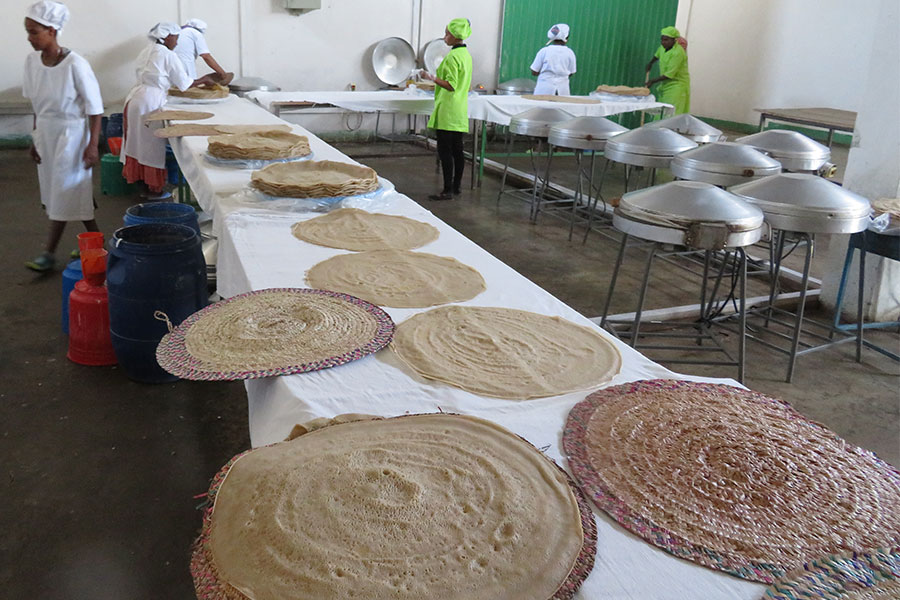
Sep 28 , 2019
By Jeffrey D. Sachs , Angelo Riccaboni
All companies in the food sector, both producers and distributors, should adopt clear guidelines, metrics and reporting standards to align with the Sustainable Development Goals and the Paris Climate agreement, write Jeffrey D. Sachs, Director of the Sustainable Development Solutions Network (SDSN), and Angelo Riccaboni, Chair of the Santa Chiara Lab at the University of Siena. This article first appeared on Project Syndicate.
Feeding a planet of 7.7 billion people is no easy matter. Every person on the planet needs, expects and has the right to a healthy diet. Every farmer needs, expects and has the right to a decent livelihood. The roughly ten million other species on the planet need a habitat in which they can survive. And every business that produces, processes, and transports food needs and expects to earn a profit.
It is a tall order – and it’s not being fulfilled. Over 820 million people are chronically hungry. Another two billion or so suffer from micronutrient deficiencies, such as a lack of vitamins or proteins. Around 650 million adults are obese, an epidemic caused in part by ultra-processed foods that are stuffed with sugar, saturated fats, and other chemical additives.
But the problems go far beyond hunger and diet. Today’s agro-industrial practices are the main cause of deforestation, freshwater depletion and pollution, soil erosion, and the collapse of biodiversity. To top it off, human-induced climate change, partly caused by the food sector, is wreaking havoc on crop production. With more warming and population growth ahead, the crisis will worsen unless decisive changes are made.
The food industry is a powerhouse of the global economy and includes some of the best-known brand names, because we connect with them every day. Solving the many intersecting food crises will be impossible unless the food industry changes its ways.
Fortunately, there is an important glimmer of hope. A growing number of food companies understand the challenge and want to forge a new direction that is consistent with human health and planetary survival. We have been asked by some of these industry leaders, convened by the Barilla Foundation, to help identify the steps needed to align the food sector with sustainable development.
Our starting point is another source of hope. In 2015, all 193 members of the United Nations agreed unanimously to two vital agreements. The first, called Agenda 2030, adopts 17 Sustainable Development Goals (SDGs) as a roadmap to human wellbeing and planetary safety. The second, the Paris climate agreement, commits the world’s governments to taking decisive action to keep global warming to less than 1.5 degrees Celsius. Both the SDGs and the Paris agreement require decisive changes in practices by the food industry.
In our report, we call on all companies in the food sector, both producers and distributors, to adopt clear guidelines, metrics, and reporting standards to align with the global goals. Specifically, each company must address four critical questions.
First, do the companies’ products and strategies contribute to healthy and sustainable diets?
We know that the fast-food culture is literally killing us. The industry has to change, urgently, to promote healthy diets.
Second, are the company’s production practices sustainable?
Too many companies are engaged in chemical pollution, massive waste from packaging, deforestation, excessive and poorly targeted fertilizer use, and other environmental ills.
Third, are the company’s upstream suppliers sustainable?
No consumer food company should use products from farms that contribute to deforestation. The destruction of forests in the Amazon and Indonesia – literally a scorched-earth process – underscore the need to barcode all food products to ensure that they are sourced from sustainable farms.
Lastly, is the company a good corporate citizen?
For example, aggressive tax practices that seek to exploit legal loopholes or weak enforcement processes should be avoided, as they deprive governments of the revenues needed to promote public services and thereby achieve the SDGs.
As part of our work, we examined the food industry’s current reporting practices. While many companies purport to pursue sustainable development, too few report on the healthfulness of their product lines or how their products contribute to healthy and sustainable dietary patterns. Too few recognize that they are part of the environmental crisis, either directly in their own production, or as buyers of products produced in environmental hotspots such as the Amazon or Indonesia. And companies don’t report in detail on their tax practices. In short, the food industry’s commitment to sustainability is still too often more high-minded sentiment than actual reporting and monitoring to ensure alignment with the SDGs and the Paris accord.
But we are not pessimistic. Around the world, young people are demanding a sustainable and safe way of living and doing business. We believe that companies, too, will change. After all, companies need customers who are satisfied, workers who are motivated, and the respect of society as a tacit “license to do business.” Some of the cases we analyzed give us hope that change is possible. As our project continues in the coming year, with the aim of working with the industry to ensure that performance, reporting, and monitoring are aligned with sustainable development, we will keep the public informed of what we see and learn.
The food sector is a key part of a larger picture. World leaders gathered at the UN this week to review progress – or lack thereof – on the SDGs and the Paris agreement. They must keep in mind one crucial fact: the world’s people are demanding change. We have the know-how and wealth to achieve a prosperous, inclusive, and sustainable world. The business sector must urgently recognize, acknowledge, and act upon its global responsibilities.
PUBLISHED ON
Sep 28,2019 [ VOL
20 , NO
1013]

Radar | Apr 08,2023

Radar | Sep 22,2024

Commentaries | Oct 14,2023

Featured | Mar 07,2020

Fortune News | Mar 14,2020

My Opinion | Mar 26,2022

Radar | Jun 01,2024

Commentaries | May 16,2020

Radar | Jun 05,2021

Viewpoints | Nov 02,2024

My Opinion | 132151 Views | Aug 14,2021

My Opinion | 128561 Views | Aug 21,2021

My Opinion | 126482 Views | Sep 10,2021

My Opinion | 124091 Views | Aug 07,2021





Dec 22 , 2024 . By TIZITA SHEWAFERAW
Charged with transforming colossal state-owned enterprises into modern and competitiv...

Aug 18 , 2024 . By AKSAH ITALO
Although predictable Yonas Zerihun's job in the ride-hailing service is not immune to...

Jul 28 , 2024 . By TIZITA SHEWAFERAW
Unhabitual, perhaps too many, Samuel Gebreyohannes, 38, used to occasionally enjoy a couple of beers at breakfast. However, he recently swit...

Jul 13 , 2024 . By AKSAH ITALO
Investors who rely on tractors, trucks, and field vehicles for commuting, transporting commodities, and f...

Jul 12 , 2025
Political leaders and their policy advisors often promise great leaps forward, yet th...

Jul 5 , 2025
Six years ago, Ethiopia was the darling of international liberal commentators. A year...

Jun 28 , 2025
Meseret Damtie, the assertive auditor general, has never been shy about naming names...

Jun 21 , 2025
A well-worn adage says, “Budget is not destiny, but it is direction.” Examining t...

Jul 13 , 2025 . By YITBAREK GETACHEW
The Addis Abeba City Revenue Bureau has introduced a new directive set to reshape how...

Jul 13 , 2025 . By BEZAWIT HULUAGER
Addis Abeba has approved a record 350 billion Br budget for the 2025/26 fiscal year,...

Jul 13 , 2025 . By RUTH BERHANU
The Addis Abeba Revenue Bureau has scrapped a value-added tax (VAT) on unprocessed ve...

Jul 13 , 2025 . By NAHOM AYELE
Federal lawmakers have finally brought closure to a protracted and contentious tax de...